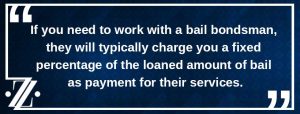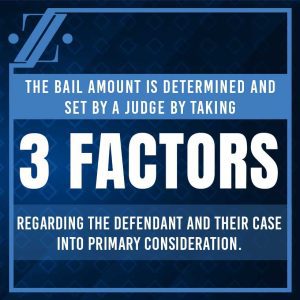
If you are familiar with the legal system (in real life or even Hollywood versions), you might hear a lot of talk about bail. But you might not totally understand what it means to pay bail or how it works in a criminal case. Bail requirements and expectations can even vary from state to state.
In Indiana, judges and court systems can set the initial bail amount for any person who committed an alleged crime, allowing them to get out of jail as they await their next court hearing.
However, gathering the funds and resources needed to pay the required amount as one lump sum can be difficult for you, your friends, or your family members, especially if you are being held in jail awaiting trial. How much bail could be requested? Can anything be done about it?
In a word, yes.
The Zentz Law defense team wants you to have every opportunity to receive a fair bail judgment when faced with a criminal lawsuit. Here, we will share tips from a criminal defense lawyer for understanding bail and bond reductions and what you need to do to get a bond reduction.
Call our law firm today at 317-220-6056.
What Is Bail?
Bail refers to the money a defendant must pay to be released pending trial. It is meant to function as collateral, typically posted by the criminal defendant’s family members or friends, to ensure the defendant appears in court as required after release. The bond amount is returned if the criminal defendant abides by their legal requirements.
The bail amount is determined and set by a judge by taking three major factors regarding the defendant and their case into primary consideration:
- Their flight risk— what’s the likelihood that the defendant fails to show up for court if they’re allowed to post bond?
- Their potential threat to society— Is it possible that the defendant poses a significant danger to the community if they’re released?
- The severity of their charges— More serious crimes have higher bonds; bail amounts can range from hundreds to millions of dollars.
Since bail is a form of collateral, the court will return the entire amount to the defendant (or the folks who posted the bail for the defendant) if and when

If you need to work with a bail bondsman, they will typically charge you a fixed percentage of the loaned amount of bail as payment for their services.
How Is Bail Determined in Indiana?


The amount of bail that can be set is also covered by federal law, via the U.S. Constitution. Per the Eighth Amendment, “Excessive bail shall not be required, nor excessive fines imposed, nor cruel and unusual punishments inflicted.”
Amounts are initially informed based on Indiana’s bond schedule and other considerations. Then a judge will either officially 1) set bail at the initial hearing or 2) endorse the bail set when presented by a sheriff.
While determining an appropriate bail amount, the court will consider all factors contributing to the risk of nonappearance or potential danger to the community.
Examples of such considerations may include:
- The defendant’s prior criminal record — If a defendant has a long criminal history, it’s possible they would be denied bail. An outstanding arrest warrant could also impact the bail decision. If a bond is set, the amount of bail is likely to be very high.
- The defendant poses a flight risk— if the defendant has no known community ties or a history of not showing up for scheduled court appearances, they would be considered a flight risk.
- The defendant’s ties to the community— does the defendant have a job? Do they have family or friends nearby?
You may be wondering what this personal history has to do with bail for criminal charges. Each piece of information helps to build a formula for evaluating the risks of releasing you from jail.
Understanding your residency history, social relationships, and work or school commitments may indicate how planted you are in the community or your financial opportunities. A defendant’s appearance in court is more likely to happen if they have ties that bind them to their community.
This serves as a predictor of whether or not you are likely to miss your court date or gather funds for the bond. Other information about your prior records, criminal history, and character may also help judges decide the likelihood of your compliance with court orders when setting a bail schedule or deciding to deny bail entirely.
The Bail Reform Act of 1984 introduced the “risk-based system” now in place, moving from a traditional bail schedule. The Bail Reform Act also increased pretrial detention in the federal system by 267%. More people than ever are jailed awaiting their trial court appearances.
Since pretrial detention is higher than ever, bail reduction is in the best interest of the penal system; jails are overcrowded, so ensuring that a defendant can afford bail makes sense to reduce the number of people in that setting.
Ultimately, the judge will set bail at the arraignment or approve an amount presented by the sheriff depending on the time at which bail is assigned.
When evidence shows that the defendant is a flight risk or lacks the appropriate ties to the community, it’s possible that the judge reconsiders setting bail at all.
It’s also possible that the judge might insist upon some form of electronic monitoring to ensure that the defendant will not leave the vicinity. This allows them to work and move about, but it provides the defendant with some supervision.
Bail vs. Bonds: Their Differences and Similarities
Often, the terms “bail” and “bond” are used synonymously or even together as in “bail bonds”. However, each term has a slightly different meaning.
Bail is the dollar amount set by the court that must be paid as your collateral for being released from jail
A bond is the money paid on your behalf by a third-party bail bond company
A bail bond is an agreement between you and the bondsman or bond company stating they will post bail for you and you will pay a fee for their service.
Some defendants consider making a plea deal because they fear they can’t pay the bail amount set for them. However, there are options available for people in this situation.
If you cannot gather enough money for bail, you may be considering the help of a bail bond company to cover your bail for a fee. Each company has different approaches to its bonding fees and payment processes. Some charge a percentage of the total bail amount. For example, you might pay $1,000 as a 10% fee for a $10,000 bail bond.
Bond businesses may require you to pay the entire amount up front or agree to a payment plan. Before signing an agreement, ask about payment expectations so you know how and when you will be expected to pay your fee.
An experienced defense team can help you understand your options and what to expect if choosing to work with a bond resource. Be sure to ask your defense attorney your questions about the bond process or other means for covering required bail if desired.
What Is the Process for Getting Bond Reductions?
You can take a few specific actions to get a bond reduction.
First, be aware of the specific court proceedings during which bond reductions can happen:
Bail reduction motion: During your first court appearance, you may ask for a bond reduction from the judge to reduce your bail. The initial bail may be reviewed and reduced by a bail review board, however, this process can vary by state.
Bond reduction hearing: You can request a formal bail hearing. A formal bail hearing is a specific court date for determining whether your bail can and should be lowered. To start the process, your defense counsel can request a motion hearing for a formal bail hearing to be approved by the judge proposing that you were given excessive bail.
Initial bail hearing: If approved, a scheduled hearing will occur where both your defense team and the prosecution will have opportunities to present evidence for or against your bond reduction. The judge will then approve or deny bond reduction at your request.
Making Your Case for Lower Bail or Bond Reduction
Whether you are preparing for your arraignment or your specific bail reduction hearing, there are a few tips to consider when you cannot afford bail and are preparing to make your case saying you were given excessive bail and are requesting that they reduce bail.
You and your defense attorney will want to make the case that even though you cannot afford bail, you pose no threat to your community and are not a flight risk nor are you likely to miss your court appearance.
To support those arguments for bail or bond reduction, you and your criminal defense attorney will gather and present information that illustrates:
- How much bail you can afford
- Your ties to the community
- Your steady employment
- Your lack of criminal history
Though these factors may seem unrelated, they can go a long way in building a positive image of you or your character. This can be important for a judge who knows very little about you as a person, only your pending criminal charges.
An experienced defense attorney can help you determine what personal information will be important to highlight and will tie it back to your bond reduction petition.
Requesting an Emergency Bond Reduction Hearing
Under special circumstances, a judge may grant an expedited, emergency bond reduction hearing to determine whether you were given excessive bail and if it can or should be reduced.
Your lawyer must communicate the nature of the emergency and the immediacy of the bail or bond reduction.
Examples of emergency circumstances for decreasing the bail amount may include:
- Being the sole care provider for a family member or loved one, particularly children or elderly persons.
- Needing medical treatment that can not be provided in jail.
- Being at risk of losing your job, home, or other necessary assets while you are detained.
In addition to these examples, you and your lawyer can consider any other pressing needs or at-risk categories specific to your case and pending trial. It is important to demonstrate how these factors could immediately impact the health or safety of yourself or others who rely on you to illustrate that you cannot afford bail and need a bond reduction.
Bail as Collateral, Not Payment
Whether or not you successfully achieve bond reduction, coming up with a large sum of money on short notice can feel stressful and intimidating. While going through the bail process, it is important to remember that this money is meant as collateral only, not as a payment.
If you appear for all required court dates and adhere to court requirements, you (or your contracted bondsman) will receive the entire amount back in full.
Though gathering the money needed for bail upfront can be challenging, remembering that the money will be returned if and when you abide by the court’s expectations may help you be open-minded to additional funding options.
How a Skilled Defense Team Can Help
Having a skilled defense team by your side can be beneficial as you navigate bond reduction in the criminal justice system. This is particularly true if or when you are unable to afford bail.
Partnering with an experienced legal team early can help you:
- Understand bail and key bail-setting systems
- Navigate the bail reduction processes and opportunities
- Build a strong defense and argument for a bond reduction
- Representing your best interests while dealing with the prosecution
- Advocate on your behalf to the judge and other justice system leaders
Effectively demonstrating your need or appropriateness for bond reduction can be challenging and nuanced. Your criminal defense attorney can guide you through this process to increase your chances of winning reduced bail.
Zentz Law: Your Criminal Defense Lawyer
Everyone deserves a fair, unbiased trial especially when faced with criminal charges. This includes having a reasonable bail set. Whether you’re facing charges in local court, superior court, or even the state supreme court, you need a strong defense lawyer on your side.
Each criminal defense lawyer at Zentz Law will work hard to provide personal attention to each case to ensure you have the best outcomes and maximize your opportunities, including maximizing your time at home by reducing your bail.
The team at Zentz Law has the experience and passion to provide you with strong, individualized defense strategies. We take pride in taking the time to walk our clients through the expected legal process, explain the systems and options before them, and develop a strong defense plan for your unique situation.
If you are facing a criminal lawsuit or want to better understand your bail reduction options, ask the defense lawyers at Zentz Law Contact our team today for your free case evaluation or call us at 317-220-6056. You can receive your free bail reduction evaluation today from an experienced criminal defense attorney.
***Please note: This page is not intended to give specific legal advice but is meant for information purposes only. Contact us to discuss your case***

